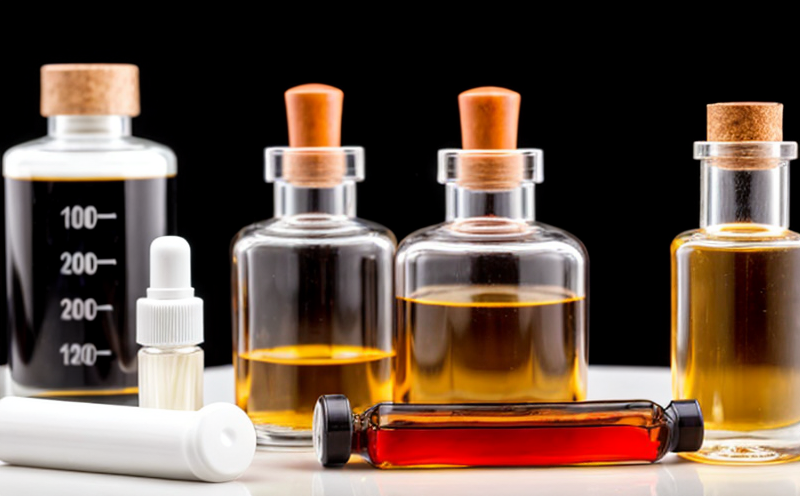Gene Therapy Product Residue Testing
The development and commercialization of gene therapy products have presented unprecedented opportunities in treating a wide range of genetic disorders. However, ensuring the safety and efficacy of these advanced therapies requires rigorous quality assurance measures. Gene Therapy Product Residue Testing is one such critical step that guarantees the purity and integrity of final drug products.
This testing process involves the identification and quantification of residual materials left behind during the manufacturing process. These residues can include excipients, trace amounts of vectors, or other non-therapeutic components that may affect product stability or patient safety. By conducting thorough residue analysis, laboratories like ours help ensure compliance with regulatory requirements such as those set forth by the FDA (Food and Drug Administration) and EMA (European Medicines Agency).
The methodology typically starts with sample preparation where the sample is dissolved in appropriate solvents before being analyzed using advanced analytical techniques. High-Performance Liquid Chromatography (HPLC), Mass Spectrometry (MS), or a combination of these methods are commonly used to detect and quantify residues at extremely low concentrations.
It's important to note that while gene therapy offers great promise, it also poses unique challenges when it comes to ensuring product purity. Residual materials from the manufacturing process can have varying impacts on drug performance depending on their nature and concentration. For instance, vectors used in viral delivery systems may degrade over time or interact unpredictably with host cells.
The significance of this testing cannot be overstated; even trace amounts of residual materials could potentially compromise the effectiveness of a gene therapy product or lead to adverse reactions. Therefore, laboratories specializing in this service must adhere strictly to established protocols and use state-of-the-art equipment to deliver accurate results consistently.
Given the complexity involved in analyzing these minute traces, it's crucial for manufacturers to partner with experienced labs capable of handling such delicate samples. Our team at [Your Lab Name] brings together years of expertise in pharmaceutical analysis along with cutting-edge technology to provide reliable Gene Therapy Product Residue Testing services. We understand that every batch must meet stringent quality standards before reaching patients.
To summarize, Gene Therapy Product Residue Testing plays a vital role in maintaining the integrity and safety of gene therapy products throughout their lifecycle—from development through production and distribution. By leveraging our comprehensive approach, we ensure that each product meets all necessary regulatory requirements while minimizing potential risks associated with residual materials.
Applied Standards
| Standard | Description |
|---|---|
| ISO 17025 | This international standard outlines the requirements for competence in testing and calibration laboratories. It ensures that our facility adheres to high-quality standards. |
| FDA Guidance on Gene Therapy Products | The U.S. Food and Drug Administration provides guidelines specifically addressing gene therapy products, ensuring they are safe and effective. |
| EMA Guidelines for Manufacturing Biologics | The European Medicines Agency sets forth stringent requirements regarding the production of biologic medicines like those employed in gene therapy. |
| ICH Q7A: Good Manufacturing Practice Guide for Active Pharmaceutical Ingredients | This International Conference on Harmonisation guideline covers good manufacturing practices for active pharmaceutical ingredients, which includes residues from manufacturing processes. |
Benefits
- Ensures product safety and efficacy by identifying and quantifying residual materials in gene therapy products.
- Aids compliance with regulatory requirements imposed by agencies such as the FDA, EMA, and ICH.
- Safeguards against potential risks associated with trace amounts of non-therapeutic components that could affect drug performance or patient health.
- Contributes to maintaining consistent quality across batches produced during different stages of development and manufacturing.
- Enhances trust between manufacturers and regulatory bodies by providing transparent, reliable data on product purity.
Why Choose This Test
The importance of Gene Therapy Product Residue Testing cannot be overstated in the context of modern biotechnology. Here are several compelling reasons why you should consider this testing:
- Patient Safety: Ensures that patients receive products free from potentially harmful residues.
- Regulatory Compliance: Helps pharmaceutical companies meet stringent regulatory standards set by global health authorities.
- Product Integrity: Guarantees the quality and reliability of gene therapy products throughout their lifecycle.
- Innovation Support: Facilitates continuous improvement in manufacturing processes through detailed analysis of residuals.
- Risk Mitigation: Minimizes the risk of adverse reactions due to trace amounts of non-therapeutic components.
By choosing our Gene Therapy Product Residue Testing service, you invest in a robust quality assurance program that supports both current and future needs within your organization. Our commitment to excellence ensures that each test delivers precise results, contributing significantly to the success of gene therapy treatments worldwide.





